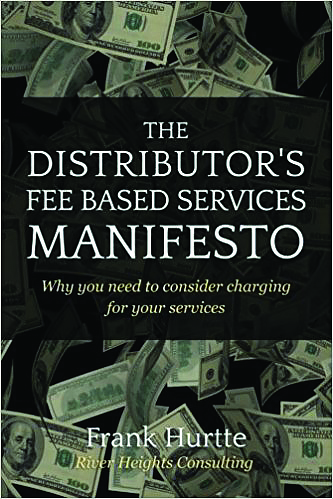IMARK members pride themselves (and rightfully so) on the level of service they provide to their customers. The high level of service is so deeply ingrained that many distributors provide the same services to every customer regardless of the customer’s level of loyalty and/or profitability. And in most instances, distributors provide these services at no extra cost to the customer.
Most IMARK members will agree with the idea that the increasing commoditization of many product lines along with disruptive sources of supply have and will continue to cause market-leading distributors to seek and implement new ways to stand out with their customers.
To put it another way, electrical distributors have to figure out how to become an essential and integral part of a customer’s business and be compensated for productivityenhancing services to a meaningful degree.
Frank Hurtte, a regular contributor to IMARK Now magazine, recently wrote The Distributor’s Fee-Based Services Manifesto: Why  You Need to Consider Charging for Your Services. In this 76-page book, he suggests that the time has come for distributors to plot a change in course so they can evolve from product suppliers into companies that provide products with a wide array of services for which they are fairly compensated. Hurtte posits that a “perfect storm is brewing. Demographics, technological shifts and mega competitors are pushing against a half-century-old business model creating hurricane force winds of change in the wholesale distribution world.”
You Need to Consider Charging for Your Services. In this 76-page book, he suggests that the time has come for distributors to plot a change in course so they can evolve from product suppliers into companies that provide products with a wide array of services for which they are fairly compensated. Hurtte posits that a “perfect storm is brewing. Demographics, technological shifts and mega competitors are pushing against a half-century-old business model creating hurricane force winds of change in the wholesale distribution world.”
Hypothetically, what if you removed the words “electrical” and “supply” from your company name and re-positioned your company as a service company that also happens to supply high-quality electrical products? How would your company change?
In his concise and practical book, Hurtte describes how many of the services provided by IMARK members can and do positively impact customers’ profitability and market share. This particularly rings true during a time when many electrical contractors are facing a painful labor shortage.
Hurtte recognizes and explains eight creators of value for customer operations:
- Replacement of internal labor
- Reduction in services from others
- Reduction in expenses (exturnal labor)
- Reduction in assets
- Increase in revenue
- Improvement in market position
- Improvement in safety/workplace
- Effect on company culture (hard to measure but important)
In his book, Hurtte makes the case: “Fee-based services do not hamper the ability to close orders—in fact it is the opposite.” Creating an effective fee structure requires service companies to develop and enhance a keen understanding of the customer’s business, which can result in a completely different kind of dialogue. The author points out, “When the copier repair person visits the customer, the meter is always running even as the highly-trained electrical expert sits in the lobby.”
In conclusion, Hurtte does not sugarcoat the challenges in developing a fee-for-service element of a distribution business. In fact, this concept flies in the face of the business culture many distributors have developed and employ. Hurtte addresses many of these challenges (salesforce resistance, customer objections, messaging redevelopment and supplier concerns) head-on and in substantive detail.
The Distributor’s Fee-Based Services Manifesto is a quick read. It is highly-recommended for the management teams that are contemplating the implementation of a “revenuefor- services” aspect of their business. The book may be purchased at amazon.com.